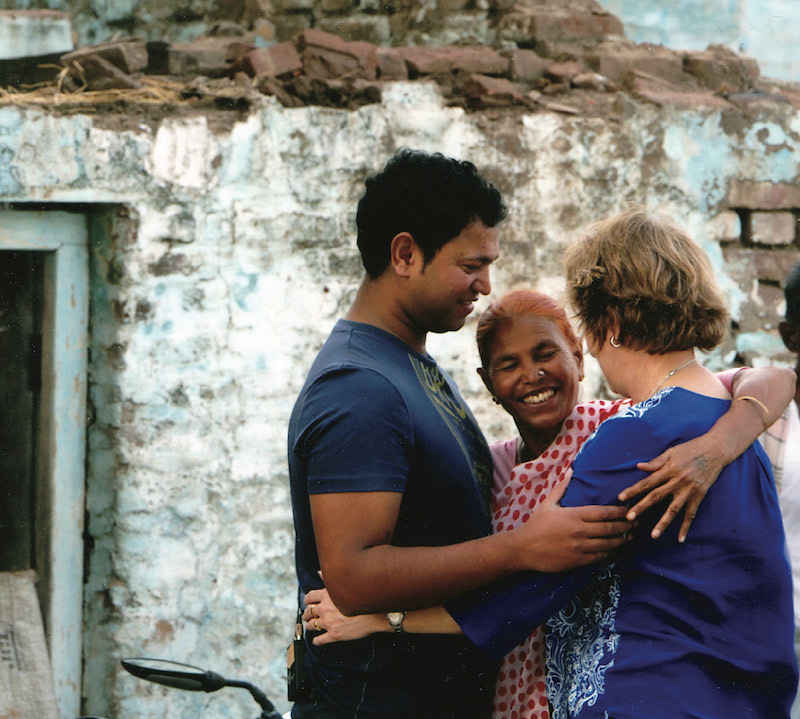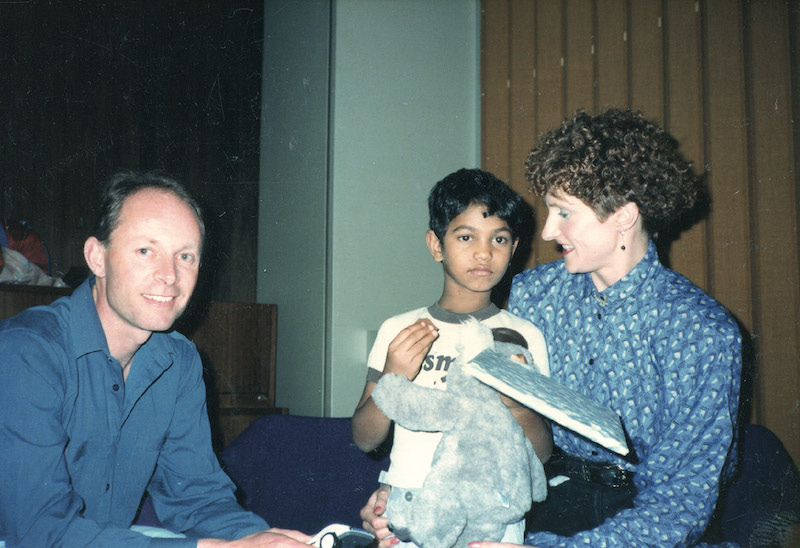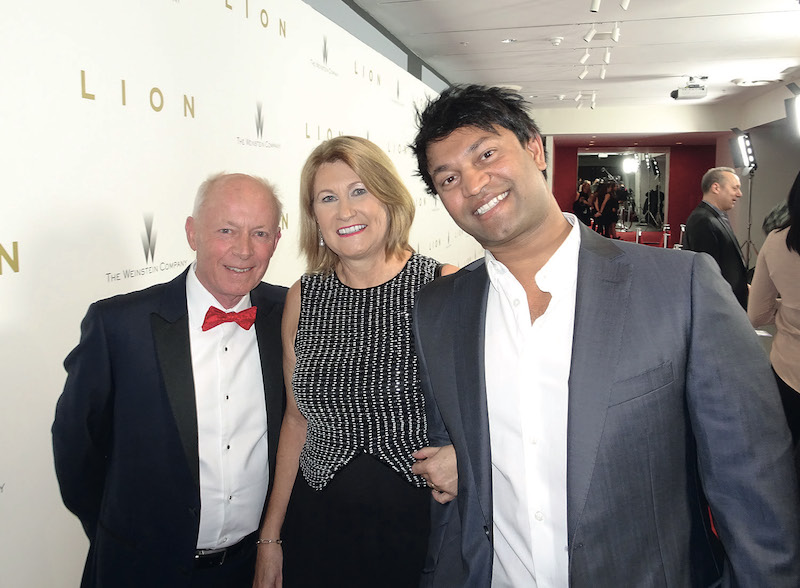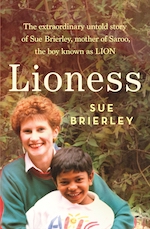I remember reading the back-cover spiel of her son’s book about four years ago. Originally titled A Long Way Home, Saroo Brierley’s memoir intrigued me. I was deeply curious about how an adopted Australian boy could have found his birth family back in India 25 years later with only the help of Google Earth. (Hint: It took a really long time.)
Not long after, the movie Lion, starring Dev Patel (as Saroo) and Nicole Kidman (as Sue Brierley), was released, and would go on to be nominated for several Oscars. It brought to life the harrowing early life of five-year-old Saroo, lost on the streets of Calcutta, a city of some 10 million people, 1600 kilometres away from home. With a young son myself, my heart bled for the young Saroo.
Saroo’s story is an interesting one made all the more amazing by the very virtue it was true, and so I wasn’t about to pass up the opportunity to read his adopted mother Sue Brierley’s memoir, Lioness (released last month), and speak with her over the phone.
“I was asked to consider [writing my story] by my son. Saroo was very keen on this idea, although to be honest, I hadn’t asked where he got the idea from,” Sue tells me when I ask her why she decided to write her book.
“But we had discussions, I thought about it for a bit and then I thought I’ll give it a go. I haven’t written anything before.”
For someone who hasn’t written anything before, her memoir was absorbing. There were parts of her story that were familiar, especially when Saroo—and later, Mantosh—joined her and husband John as their sons. What I never expected was the traumatic childhood Sue herself had to endure growing up.

Sue and Saroo meeting Saroo’s birth mother, Fatima, in 2013.
A dark and violent past
Sue grew up in the 1950s, the daughter of a violent and selfish father, and a resigned and sometimes aloof mother. Writing the book was a difficult process, Sue admits, because it dug up a lot of dark things in her early years.
“I’ve really kept it hidden from my life and very few know the whole story about me,” she says. “Even my sons don’t really have a clue to what extent my hardships had been in my early years, so it was quite an eye-opener for them to read what was going on.”
Unexpectedly, writing her memoir has turned out to be a bit of a gift to her sons. Children are always keen to hear stories of their parents’ past, and it helps them to find their place within themselves and the family.
“I think it’s a good thing,” Sue agrees. “I have heard of other people writing a memoir, not necessarily for publication, but to put in the bottom drawer for their children to find and to fill in the gaps.
“If I hadn’t undertaken the writing, I don’t know if I would ever have sat down to tell them about my early years. I think it is a kinder way. It was easier for them to just quietly read through my words, whereas I think it would have been very difficult to tell them in person.
“This way, it was a little more gentle, and especially for my younger son, Manny. He read the book with his partner and had quite a few tears over it because it was such an unknown part of my life. It gave him a bit of a shock. Saroo was also quite surprised by a lot of the things.”
If you’ve read A Long Way Home and now Lioness, you would have gotten a bit of an idea of the challenges Sue had with raising Mantosh (Manny). Adopted at around nine years of age, Mantosh arrived deeply traumatised, with signs of having been abused, and often had violent episodes. Now 38, Mantosh understands the deep hurt he caused Sue.
“He apologised to me for giving me such a hard time as he was growing up and being very difficult and challenging,” she says. “I really appreciated that because I feel, now as a man, he’s got a full comprehension of what was going on for him and also how that affected me.”
A new definition of motherhood

The night Sue and her husband John met Saroo at Tullamarine Airport in Melbourne in 1987. “He was a dream come true.”
Sue is as articulate and passionate on the phone as she was in writing Lioness. There is a seriousness in her manner, but you can tell she also has much love to give. Both passion and love come to fore when we turn our conversation to adoption, families and motherhood.
In fact, if there’s one thing she wants her memoir to achieve, it’s for readers to “take away a broader view of family, how they are made up and how successful they are. I want to dispel the myth that the birth family is superior and the birth mother is the one, because I feel that as a woman, I’m quite happy to say that I’ve raised my sister’s children.”
Too long, Sue believes, society has viewed adoption and adopted children as inferior. “If you adopt a child, that’s so often a negative thing because people think that’s the second best thing because you couldn’t produce your own baby,” she says. “I really dislike that because that is labelling adopted children second best.
“These children [Saroo and Mantosh] are my first choice and I spent a lot of time trying to validate that and this book will be my final comment on that to publicly say that these boys were our first choice.”
For Sue, what’s more important when it comes to raising children isn’t biology, but love and good intentions. It’s an idea partly influenced by her own experience. As she wrote in her memoir, “I was made to believe that children were incidental—that they just happened along and that their purpose was to work hard and support their family.”
Filled with the sense that her parents had everything wrong, she resolved to treat any children she had differently.
“If you are going to be a mother, you have to choose that as a task, as an undertaking, and furthermore, you have to prepare yourself for it,” she says. “It really needs to be more considered and more effort put into being the best mother possible.
“If you’ve got purity of love and good intentions, then you know how to undertake your actions. If you don’t have the love or good intentions, you just flounder around doing a very ordinary job of being a mother, and that’s not a good thing in our society. It’s such a terrible shame.”
Her views are reminiscent of the Bible, in which it states if our actions and behaviour do not originate from love, we gain nothing.
Sue admits to feeling nervous about sharing her views because she realises it may not be popular, “but in the end, I’m at the stage in my life that I feel that I’ve got to tell the truth. I can’t watch my society behaving in a way that’s really no better than it was when I was a child and that’s my purpose.
“The life that you have in your hands,” she continues, “you really have one opportunity to make that good—it’s very difficult to recover from harm that’s caused in childhood.”
Sue speaks from personal experience in that instance, saying that all the damage and abuse she had to endure as a child (heartbreakingly detailed in her memoir) will continue to be with her till the day she dies.
Trusting God

At the world premiere of Lion at the Museum of Modern Art, New York, in 2016.
As we wrap up our conversation, I take the opportunity to confess to Sue I once considered adoption—for the same reasons she listed; there are too many children in the world who need to be loved—but never found the courage to do so.
Her response is typical of her underlying spirituality and inherent trust in a higher power. Often, when her children were young, she would send prayers to ensure their birth mothers knew Saroo and Mantosh were safe and well loved.
“Once you choose your path and set it in your heart, do not give up. I know how to stay the path and it took a long time, but I would never regret it. Don’t give up. I trust the heavens,” she assures me.
Reading Sue’s memoir and in speaking with her, it’s obvious she stands for no nonsense. And yet, within that, is an overwhelming well of love. I get the sense that she still hasn’t gotten used to all the attention she’s received since the release of Saroo’s memoir and subsequent movie—and now her memoir.
“This has been insanity for me, all these talks and chats,” she admits. “But I have enjoyed our little chat. It’s been lovely.”
And it had indeed been lovely.

Lioness by Sue Brierley is out now.
WIN CHILDREN’S BOOKS!
Submit a personal story on your parenting journey, thoughts or experience and if we use your story, we’ll send you a selection of children’s books! Write to us at editorial@mumsatthetable.com.
This post includes affiliates and/or paid inclusions.
How helpful was this article?
Click on a star to rate it!
4.3 / 5. 27
Be the first to rate this post!
Melody Tan
Related posts
Subscribe
Receive personalised articles from experts and wellness inspiration weekly!

